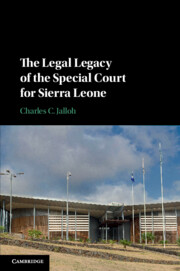Book contents
- The Legal Legacy of the Special Court for Sierra Leone
- The Legal Legacy of the Special Court for Sierra Leone
- Copyright page
- Dedication
- Contents
- Preface and Acknowledgments
- Table of Authorities
- Abbreviations
- 1 Introduction
- 2 The Sierra Leone Conflict
- 3 The Establishment of the Special Court for Sierra Leone
- 4 The Special Court’s Jurisdiction, Organization, and Trials
- 5 “Greatest Responsibility” Personal Jurisdiction
- 6 Forced Marriage As a Crime Against Humanity
- 7 Child Recruitment As a War Crime
- 8 Head of State Immunity
- 9 Amnesties
- 10 Special Courts and Truth Commissions
- 11 Conclusion
- Appendices
- Selected Bibliography
- Index
6 - Forced Marriage As a Crime Against Humanity
Published online by Cambridge University Press: 29 July 2020
- The Legal Legacy of the Special Court for Sierra Leone
- The Legal Legacy of the Special Court for Sierra Leone
- Copyright page
- Dedication
- Contents
- Preface and Acknowledgments
- Table of Authorities
- Abbreviations
- 1 Introduction
- 2 The Sierra Leone Conflict
- 3 The Establishment of the Special Court for Sierra Leone
- 4 The Special Court’s Jurisdiction, Organization, and Trials
- 5 “Greatest Responsibility” Personal Jurisdiction
- 6 Forced Marriage As a Crime Against Humanity
- 7 Child Recruitment As a War Crime
- 8 Head of State Immunity
- 9 Amnesties
- 10 Special Courts and Truth Commissions
- 11 Conclusion
- Appendices
- Selected Bibliography
- Index
Summary
This chapter examines the Special Court for Sierra Leone’s legal legacy through the novel prosecution of forced marriage as a crime against humanity. In the various SCSL trials, the Prosecutor had invoked “other inhumane acts” to argue that forcing kidnapped women and girls to marry militants during the civil war constituted a crime against humanity. As the Court would ultimately only hold that the AFRC and the RUF cases met the elements of the crime against humanity of forced marriage, the chapter examines the diverging rulings of two separate trial chambers on the new crime. The chapter then analyzes the Appeals Chamber’s ruling and interpretation of the precedents from the International Criminal Tribunals for the Former Yugoslavia and Rwanda in progressing the recognition of gender-based crimes. The chapter goes on to assess whether the Appeals Chamber judgment was based on existing law or whether the Court had sought to progressively develop the law to recognize forced marriage as a crime against humanity. Finally, it addresses the fair trial concerns raised by the addition of new crimes during an ongoing criminal proceeding. The author concludes that the Special Court rulings in this area constitute landmark contributions to international law.
Keywords
- Type
- Chapter
- Information
- The Legal Legacy of the Special Court for Sierra Leone , pp. 150 - 186Publisher: Cambridge University PressPrint publication year: 2020
- 1
- Cited by

